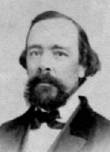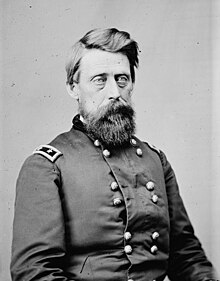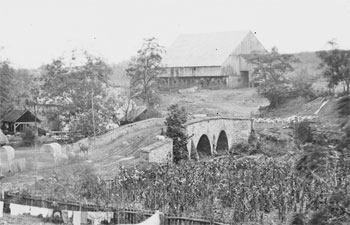 |
| Firing across the Potomac at Sherpardstown |
HEADQUARTERS ARMY OF THE POTOMAC,
September 19, 1862 - 8.30 a. m. (Received 11 a. m.)
Major General H. W. HALLECK,
General-in-Chief:
But little occurred yesterday except skirmishing, being fully occupied
in replenishing ammunition, taking care of wounded, &c. Last night
the enemy abandoned his position, leaving his dead and wounded on the
field. We are again in pursuit. I do not yet know whether he is falling
back to an interior position or crossing the river. We may safely claim a
complete victory.
GEO. B. MCCLELLAN,
Major-General.
HEADQUARTERS ARMY OF THE POTOMAC,
September 19, 1862 - 10.30 a. m. (Received 11 a. m.)
Major General H. W. HALLECK,
General-in-Chief:
Pleasonton is driving the enemy across the river. Our victory was
complete. The enemy is driven back into Virginia. Maryland and
Pennsylvania are now safe.
GEO. B. MCCLELLAN,
Major-General.
WASHINGTON, D. C.,
September 19, 1862. (Sent 12.30 p. m.)
Major-General MCCLELLAN:
Yours of 8.30 and 10.30 are just received. All available troops from
railroad guards were sent to you yesterday. Enemy's forces at Leesburg
were moved yesterday. Stoneman's provisional division, unless ordered
otherwise by you, is still guarding fords below Point of Rocks. So long
as the river remains low there is much danger of a movement below your
left. Letters received here give it as a part of Lee's original plan to
draw you as far as possible up the Potomac, and them move between you
and Washington. Perhaps his defeat may be such as to prevent the
attempt.
H. W. HALLECK,
General-in-Chief.
HEADQUARTERS ARMY OF THE POTOMAC,
Sharpsburg,
September 19, 1862--1.15 p. m.
Brigadier-General PLEASONTON:
GENERAL: Your two dispatches just received. General McClellan directs me
to say that he does not propose to cross the river, and that he does
not desire you to do so, unless you see a splendid opportunity to
inflict great damage upon the enemy without loss to yourself.
I am, general, very respectfully, your obedient servant,
R. B. MARCY,
Chief of Staff.
[19.]
HEADQUARTERS ARMY OF THE POTOMAC,
September 19, 1862-8.15 p. m. (Received 8.30 p. m.)
Major General H. W. HALLECK, General-in-Chief:
As an act of justice to the merits of that most excellent officer, Major
General Joseph Hooker, who was eminently conspicuous for his gallantry
and ability as a leader in several hard-fought battles in Virginia, and
who, in the battle of Antietam Creek, on the 17th instant, was wounded
at the head of his corps while leading it forward in action, I most
urgently recommend him for the appointment of brigadier-general in the
U. S. Army, to fill the vacancy created by the death of the late
Brigadier-General Mansfield. this would be but a fit reward for the
service General Hooker rendered his country. I feel sure his appointment
would gratify the entire army.
GEO. B. McCLELLAN,
Major-General.
HEADQUARTERS ARMISTEAD'S BRIGADE,
September 19, 1862.
General PENDLETON, Commanding:
GENERAL: In obedience to your request that I would keep you posted, I
have the honor to state that Colonel Edmond, Thirty-eighth Virginia,
reports that we have not a piece of artillery in position, firing., and
the enemy have, as far as he could ascertain, twenty-odd. There is
nothing to prevent the enemy from crossing except the line of
sharpshooters on the river.
Very respectfully, your obedient servant,
JAS. GREGORY HODGES,
Colonel, Commanding Armistead's Brigade.
HEADQUARTERS ARMY OF THE POTOMAC,
September 19, 1862--10 p. m.
Brigadier-General PLEASONTON:
GENERAL: Colonel Hunt opened nineteen guns on the enemy just before dark
and kept up his fire until night set in. The enemy scattered in all
directions. An infantry force of about 400 men was crossed immediately,
and it is believed that five or six guns have fallen, or will fall, into
our possession. Colonel Hunt thinks that you should be at the river by
daylight without fail, and that you should take your artillery with you.
General McClellan concurs fully in this, and directs that you push your
command forward after the enemy as rapidly as possible, using your
artillery upon them wherever an opportunity presents, doing them all the
damage in your power without incurring too much risk to your command.
If great results can be obtained, do not spare your men or horses.
I am, general, very respectfully, your obedient servant,
R. B. MARCY,
Chief of Staff.
P. S.--Our troops will hold the heights on the opposite side of the river during the night.
[19.]
R. B. M.
HEADQUARTERS ARMY OF THE POTOMAC,
September 19, 1862--11 p. m.
Brigadier-General PLEASONTON:
GENERAL: The rebel General Stuart is reported to have moved to
Williamsport with 4,000 cavalry and six pieces of artillery. It is also
reported that 10,000 infantry of the enemy are approaching Williamsport
from Winchester. Couch has been ordered to move to Williamsport so as to
be there at daylight, picking up Colonel Voss' regiment of cavalry at
Jones' Cross-Roads. General McClellan, therefore, directs that you send
out immediately sufficient cavalry to scout all the roads on our right,
to give timely notice of the approach to this point of any mounted force
of the enemy. You will send two batteries with half of your entire
cavalry force to report at daylight in the morning to Major-General
Porter at Shepherdstown. With the remainder of your cavalry and two
batteries of artillery you will proceed at once to Jones' Cross-Roads,
and there await the arrival of General Couch's command. From this point
you will move on Williamsport with General Couch, and co-operate with
him in capturing, if possible, or elese in driving off, such force of
the enemy as may be found there.
I am, general, very respectfully, your obedient servant,
R. B. MARCY,
Chief of Staff.
[19.]
HEADQUARTERS ARMY OF THE POTOMAC,
Keedysville [Md.],
September 19, 1862.
Major General FITZ JOHN PORTER:
GENERAL: General Sumner reports that the enemy's artillery is moving to
the west, and that he (the enemy) is felling trees behind him, as
elsewhere. The commanding general directs you to push forward your
pickets; ascertain if the enemy appears to be retiring, and, if so, to
mass your troops in readiness to move in any direction. The corps
commanders and General Pleasonton are directed to do the same, and the
latter to throw out small cavalry detachments on the various roads
leading from our position in the direction of the enemy's retreat, to
ascertain the nature and degree of the obstructions therein.
I am, general, very respectfully, your obedient servant,
R. B. MARCY,
Chief of Staff.
HAGERSTOWN, MD.,
September 19, 1862 - 9.30 p. m.
Major-General HALLECK:
Our information this evening, from a reliable source, is that the enemy
in front of McClellan commenced to cross the river last night, and
finished this morning. They are all on the south side. A force of the
enemy occupies Williamsport and threatens Hagerstown; numbers not
ascertained, but further information expected to-night. About 7,000
Pennsylvania militia, under General Reynolds, have gone toward
Williamsport. In case of any attack on Hagerstown, which I do not
apprehend, we will take care that no considerable amount of supplies
falls into the hands of the enemy.
H. HAUPT.
HARRISBURG, PA., September 19, 1862.
HEADQUARTERS ARMY OF THE POTOMAC,
September 19, 1862 - 10.45 p. m.
Major-General PORTER:
GENERAL: General Pleasonton has been directed to have his cavalry and
artillery at the river by daylight, and has been informed that you
intend to cross at that time, and would co-operate with him.
I am, general, very respectfully, your obedient servant,
R. B. MARCY,
Chief of Staff.
BALTIMORE, MD.,
September 19, 1862 - 11.40 p. m.
Honorable E. M. STANTON, Secretary of War:
We have about 10,000 prisoners surrendered at Harper's Ferry, and
ordered to Annapolis. These, with what are there, will make 20,000. We
require, to keep these men in order, four regiments. I have one
miserable regiment at Annapolis. I have another ordered from Patuxent
there, but it is a very poor regiment. Two other regiments ought to be
sent there immediately, in consequence of the plundering propensities of
the prisoners, of which there are many complaints. I have none to
spare, having sent all I could spare to General McClellan. I have a dispatch that the rebels have recrossed the Potomac. Look out for
Washington. You are not out of the woods. The rebels are a day a half in
advance of McClellan.
JOHN E. WOOL,
Major-General.
[P. S.] - Colonel Miles had about 12,000 men for the defense of Harper's
Ferry, including 1,500 cavalry, which made their escape before the
surrender.
Official Records, Series I., Vol. 19, Part 2, Page 331 and various others.
In victory as in defeat, McClellan is hesitant. He has Lee's army, much diminished, trying to recross the Potomac back into Virginia. But he is cautious, ordering contact with the enemy only insofar as it would be at a great advantage. He claimed a complete victory, but victory would not be complete without an aggressive pursuit of Lee's army. One such point of advantage is Boteler's Ford near Shepardstown. Lee had sent Pendleton there with 45 guns and two infantry brigades. About dusk, 2,000 infantrymen under Griffin (Porter's V Corp) crossed and took 4 guns. The following morning, the Union forces would attempt to cross in more force and A.P. Hill's division would have to counter march 5 miles to retake possession of the ford under heavy artillery fire from Hunt's guns. It is worth noting, while commenting on McClellan's lack of aggressiveness, these dispatches reflect a concern Lee would still threaten Washington once he recrossed the Potomac, being already a day and a half's march ahead of the Army of the Potomac.











